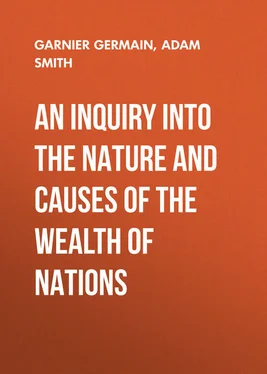In plentiful years, the bounty, by occasioning an extraordinary exportation, necessarily raises the price of corn above what it otherwise would be in those years. To encourage tillage, by keeping up the price of corn, even in the most plentiful years, was the avowed end of the institution.
In years of great scarcity, indeed, the bounty has generally been suspended. It must, however, have had some effect upon the prices of many of these years. By the extraordinary exportation which it occasions in years of plenty, it must frequently hinder the plenty of one year from compensating the scarcity of another.
Both in years of plenty and in years of scarcity, therefore, the bounty raises the price of corn above what it naturally would be in the actual state of tillage. If during the sixty-four first years of the present century, therefore, the average price has been lower than during the sixty-four last years of the last century, it must, in the same state of tillage, have been much more so, had it not been for this operation of the bounty.
But, without the bounty, it maybe said the state of tillage would not have been the same. What may have been the effects of this institution upon the agriculture of the country, I shall endeavour to explain hereafter, when I come to treat particularly of bounties. I shall only observe at present, that this rise in the value of silver, in proportion to that of corn, has not been peculiar to England. It has been observed to have taken place in France during the same period, and nearly in the same proportion, too, by three very faithful, diligent, and laborious collectors of the prices of corn, Mr Dupré de St Maur, Mr Messance, and the author of the Essay on the Police of Grain. But in France, till 1764, the exportation of grain was by law prohibited; and it is somewhat difficult to suppose, that nearly the same diminution of price which took place in one country, notwithstanding this prohibition, should, in another, be owing to the extraordinary encouragement given to exportation.
It would be more proper, perhaps, to consider this variation in the average money price of corn as the effect rather of some gradual rise in the real value of silver in the European market, than of any fall in the real average value of corn. Corn, it has already been observed, is, at distant periods of time, a more accurate measure of value than either silver or, perhaps, any other commodity. When, after the discovery of the abundant mines of America, corn rose to three and four times its former money price, this change was universally ascribed, not to any rise in the real value of corn, but to a fall in the real value of silver. If, during the sixty-four first years of the present century, therefore, the average money price of corn has fallen somewhat below what it had been during the greater part of the last century, we should, in the same manner, impute this change, not to any fall in the real value of corn, but to some rise in the real value of silver in the European market.
Конец ознакомительного фрагмента.
Текст предоставлен ООО «ЛитРес».
Прочитайте эту книгу целиком, купив полную легальную версию на ЛитРес.
Безопасно оплатить книгу можно банковской картой Visa, MasterCard, Maestro, со счета мобильного телефона, с платежного терминала, в салоне МТС или Связной, через PayPal, WebMoney, Яндекс.Деньги, QIWI Кошелек, бонусными картами или другим удобным Вам способом.
It is mentioned, that when about three years old, he was stolen from the door of his uncle, Mr. Douglas, in Strathenry, where his mother had been on a visit, by some tinkers, or gypsies. He was rescued in Leslie wood by his uncle, who was thus the happy instrument, Mr. Stewart observes, of preserving to the world, a genius, which was destined, not only to extend the boundaries of science, but to enlighten and reform the commercial policy of Europe.
Boswell's Life of Johnson, vol. iv. p. 17
Edinburgh Review, vol. i. p. 432.
It may not be uninteresting to mention what has been said of the manner in which the writings of Mr. Smith were composed. – 'Mr. Smith observed to me, not long before his death,' says Mr. Stewart, 'that after all his practice in writing, he composed as slowly, and with as great difficulty as at first.' He added, at the same time, that Mr. Hume had acquired so great a facility in this respect, that the last volume of his History was printed from the original copy, with a few marginal corrections. Mr. Smith, when be was employed in composition, generally walked up and down his apartment, dictating to a secretary. All Mr. Hume's works, it has been said, were written with his own hand.
This observation, as may easily be perceived, cannot apply in certain indirect imposts, such as those for the support of the roads; which, as they cannot be confounded with the price of any consumable commodity, combine all the inconveniencies of indirect, with those of direct imposts.
Plin. Hist. Nat. lib. 33, cap. 3.
Pliny, lib. xxxiii. cap. 3.
This was written in 1773, before the commencement of the late disturbances.
See his scheme for the maintenance of the poor, in Burn's History of the Poor Laws.
See Denisart, Article Taux des Interests, tom. iii, p. 18.
See Idyllium xxi.
See Madox Firma Burgi p. 26 &c.
See the Statute of Labourers, 25, Ed. III.
Voyages d'un Philosophe.
Douglas's Summary, vol. ii, p. 372, 373.
See his Preface to Anderson's Diplomata Scotiæ.
Lowndes's Essay on the Silver Coin, 68.












